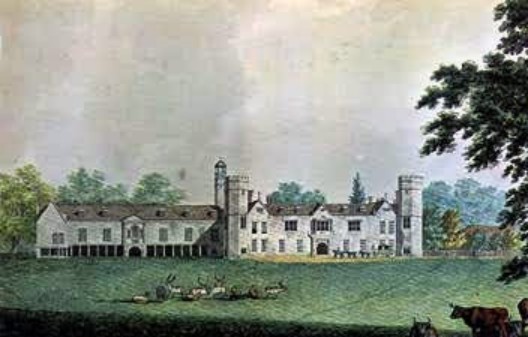_small.jpg)
Sir Nicholas BACON, Lord Keeper of the Great Seal
Born: 28 Dec 1510, Chislehurst, Kent, England
Died: 20 Feb 1579, Gorhambury, England
Father: Robert BACON
Mother: Eleanor (Isabel) CAGE
|
Married 1: Jane FERNELEY 5 Apr 1540
Children: 1. Edward BACON 2. Nathaniel BACON of Stiffkey (Bt.) 3. Nicholas BACON 4. Anne BACON5. Elizabeth BACON 6. Jane BACON 7. John BACON |
Married 2: Anne COOKE BEF Feb 1553 Children: 8. Mary BACON9. Susan BACON 10. Edmund BACON 11. Anne BACON 12. Anthony BACON 13. Francis BACON (1° V. St. Albans)
|
Sir Nicholas Bacon, Lord Keeper of the Seal
The details in this biography come from the History of Parliament, a biographical dictionary of Members of the House of Commons.
Was born probaly in a house belonging to the parents of Sir Francis Walsingham at Chislehurst, Kent. Educ. Bury St. Edmunds sch.; Corpus, Camb. adm. 1523, BA 1527; G. Inn, adm. 1532, called 1536. Married first, disp. 5 Apr 1540, Jane (d. Oct 1552 or later), dau. of William Ferneley of London, by whom he had four sons: Edward, Nathaniel, Nicholas and John; and three daughters. He married second, by Feb 1553, Anne, dau. of Sir Anthony Cooke, by whom he had the famous Bacon brothers, Anthony and Francis, and two daughters. He probably gave Edward VI instruction in the law. Kntd. (?15) Dec 1558. Bencher, G. Inn 1550, treasurer 1552-6, jt. (with Gilbert Gerard) treasurer 1556. Solicitor, ct. augmentations 18 Mar 1540-Jan 1547; commr. chantries, Mdx. and London 1546, Norf. 1548, relief, Suff. 1550, heresies 1552, to administer oath of supremacy, dioceses of Ely and Norwich 1559; attorney, ct. wards and liveries 2 Jan 1547-8 Feb 1561; j.p. Cambs., Suff. 1547-d., numerous other counties 1558/59-d.; Soon after Elizabeth's rise to power, 22 Dec 1558, became Lord Keeper of the Seal and the family immediately moved to York House on the Strand. PC 22 Dec 1558-Nov 1563, Apr 1565-d.; bailiff of liberty, duchy of Lancaster, Clare honor 20 Jun 1559-24 Jun 1562, jt. (with s. Nicholas) steward, Clare honor 29 Jul 1562-d.; high steward, St. Albans, Herts. by 1562.
In 1538 Cranmer recommended Bacon to Cromwell, who chose Bacon, Robert Carey and Thomas Denton to advise on the establishment of a new inn of court for the training of ‘King's students of the law’ for the public service. Bacon's election in 1542 for Westmorland looks like the work of the 1st Earl of Cumberland, the hereditary sheriff, in deference to an official recommendation, although it could have owed something to Cumberland's connexion with the Duke of Suffolk.

Anne Cooke Portrait attributed to George Gower, 1580 |
His return for the Parliament of 1545 he almost certainly owed to Sir Thomas Arundell, a recent colleague of his in the augmentations. It was while he was a Member of this Parliament that he received his first promotion. When in 1547 Hendley resigned the attorneyship of the augmentations in favour of Richard Goodrich, Bacon succeeded Goodrich as attorney in the court of wards; the two had commenced their new duties in the previous Sep. Bacon's marriage to the daughter of a Londoner of Suffolk origin augmented his fortune and commercial connexions. His second wife, Anne Cooke, was his equal in variety of interests and accomplishments. The marriage strengthened Bacon's ties with Sir William Cecil. Bacon's part in the succession crisis nothing is known. His wife left Redgrave to join Mary at Kenninghall and travelled with her to London, a service which may have helped to keep him in office. The reforms in the court of wards which he had initiated under Edward VI were continued under Mary, but his project for the education of the wards themselves came to nothing. |

Gorhambury
In 1571, after the downfall of Thomas Howard, Duke of Norfolk, he was given the nomination of both knights of the shire for Norfolk and one of those for Suffolk.
Archbishop Parker reprimanded Bacon for maintaining a preacher who encouraged prophesying and for being lenient towards Puritans but not towards Catholics, but their friendship survived these rifts, and it was at Parker's suggestion that Bacon gave 70 books to the library of Corpus Christi College. By his will of 23 Dec 1578 Bacon left £200 towards the building of a new chapel at Corpus, remembered the poor, and provided for his wife, children and nephew Robert Blackman. He named two of his sons executors and his brother-in-law Cecil supervisor. Under a schedule dated three years earlier and attached to the will he provided for his servants and left rings to relatives, friends and colleagues. He died in London on 20 Feb 1579 and was buried in St. Paul's, where he had already erected a monument. Several portraits survive of Bacon in old age.
 to Bios
Page
to Bios
Page |
|
 to Peerage Page
to Peerage Page |
 to Home Page
to Home Page |